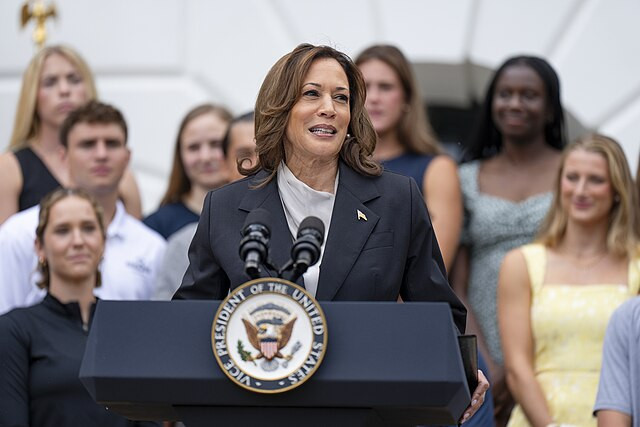Vice President Kamala Harris and former U.S. Representative Liz Cheney joined forces in Chester County, Pennsylvania, on Monday, delivering a bipartisan appeal to Republican and undecided voters as the 2024 presidential election approaches its final stretch. In a moderated conversation, both Harris and Cheney portrayed former President Donald Trump as a threat to democracy, seeking to sway voters uncomfortable with Trump's leadership and rhetoric.
The event in Pennsylvania was the first stop on a three-state campaign tour for Harris and Cheney, with further appearances scheduled in Michigan and Wisconsin. Their collaboration marked an effort to bridge political divides, particularly targeting Republican voters who may be uneasy about supporting Trump again. Pennsylvania, with its 19 electoral votes, is a crucial battleground state. A recent CBS News poll showed Harris and Trump tied in the state, underscoring its importance to both campaigns.
"People around the world are watching," Harris said. "And sometimes, I do fret a bit about whether we, as Americans, truly understand how important we are to the world." Harris expressed her desire to turn the page on the past decade of American politics, stating that her presidency would bring a new generation of leadership. She emphasized that a Harris administration would not simply continue President Biden's policies but would introduce new ideas to the table.
Harris was direct in her criticism of Trump, accusing him of using the presidency to "demean and to divide us." She added, "I think people are exhausted with that, rightly. And it does not lead to the strength of our nation to tell American people that we must be suspicious of one another, distrust one another."
Cheney, once a prominent figure in the Republican Party's leadership, lost her House seat after supporting Trump's impeachment following the January 6, 2021, attack on the U.S. Capitol. On Monday, she explained her decision to endorse Harris by emphasizing her commitment to the Constitution over party loyalty. "The choice between Harris and Trump on foreign policy is absolutely clear," Cheney said, labeling Trump as "totally erratic, completely unstable."
"Our adversaries know they can play Donald Trump," Cheney continued. "They absolutely know they can play him, and we simply can't afford to take that risk." Cheney highlighted her concern about Trump's refusal to accept the results of the 2020 election and his role in the January 6 insurrection, framing these events as evidence of Trump's disregard for democratic principles.
"I know the most conservative of all conservative principles is being faithful to the Constitution," Cheney said. "You have to choose in this race between someone who has been faithful to the Constitution, who will be faithful, and Donald Trump, who, it's not just us predicting how he will act. We've watched what he did after the last election. We've watched what he did on January 6."
Cheney also drew on her experience working overseas before her time in Congress, warning of the fragility of democracies. "I know how quickly democracies can unravel," she said. "And I know that, as Americans, we can become accustomed to thinking, 'Well, we don't have to worry about that here.' But I tell you again, as someone who has seen firsthand how quickly it can happen, that is what is on the ballot."
While Harris focused on the need for a stable, forward-looking government, Cheney urged Republican voters to prioritize defending democratic values over party allegiance. "I know there are Republicans out there who will vote for Harris but won't say it publicly," Cheney said, expressing optimism that their message would resonate with moderate voters.
Harris concluded her remarks by calling for a return to a "healthy two-party system," emphasizing the importance of fact-based debates and policy discussions. "We need to be able to have these good, intense debates about issues that are grounded in fact," Harris said. "Let's start there." Cheney responded in agreement, underscoring their shared belief in the importance of a functioning democracy.
In a statement released after the event, Trump campaign spokesperson Kush Desai dismissed the bipartisan appearance as irrelevant, calling it an attempt to showcase "former Republicans of the past" and criticizing Harris's record on immigration, economic issues, and foreign policy. Trump's attacks also extended to Cheney on social media, labeling her "dumb as a rock" and a "war hawk."
The event was part of Harris's broader effort to appeal to moderate voters and Republicans disillusioned with Trump, especially in swing states that could decide the election. Harris and Cheney's campaign tour will continue in Oakland County, Michigan, and Waukesha County, Wisconsin-both regions critical in the 2020 election and seen as potential areas for persuading undecided voters.
As the election draws near, Harris has increasingly focused her messaging on Trump's efforts to undermine democratic norms, describing him as "unstable" and "unhinged." Cheney echoed these sentiments, emphasizing the seriousness of the upcoming election and the potential consequences of a second Trump term. "I do believe that Donald Trump is an unserious man," Cheney said, "and the consequences of him ever getting back into the White House are brutally serious."






